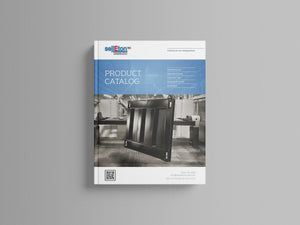
Top Construction Scale Options for On-Site Precision
Need precise weight measurements on your construction site? Construction scale solutions are your answer for accuracy, safety, and efficiency. Learn about the types, features, and benefits of top construction scales in this guide.
Key Takeaways
-
Heavy-duty scales enhance construction project efficiency by providing accurate weight measurements, reducing delays and material wastage.
-
Different types of construction scales, including platform scales, floor scales, and washdown scales, are essential for diverse operational needs and ensure precision and durability.
-
Regular maintenance and calibration are crucial for sustaining accuracy and longevity in construction scales, promoting safety and preventing costly errors.
The Importance of Heavy-Duty Scales in Construction
Heavy-duty scales are the backbone of any successful construction project. They enhance project efficiency by providing quick weight measurements, eliminating guesswork, and reducing delays. Imagine a construction site where materials are weighed accurately and promptly, leading to smoother operations and faster project completion. One construction site reported a 30% increase in productivity after implementing Selleton Scales for precise weight measurements. This significant boost underscores the critical role these scales play in enhancing workflow efficiency.
Precise measurements maintain quality control, comply with industry standards, and optimize operational efficiency. High-quality industrial scales prevent material wastage, minimize shipping and receiving errors, and ensure consistent product quality. Reliable weighing equipment can significantly cut costs and boost productivity, making it a wise investment for any construction firm.
Accurate weight measurements are also crucial for safety. Overloaded machinery can lead to accidents and equipment damage. Heavy-duty scales provide the precision needed to maintain safety standards and prevent such mishaps. These scales ensure correct material handling, safeguarding both workers and equipment on construction sites.
Types of Construction Scales
The construction industry relies on various types of scales to meet its diverse needs. Platform scales are designed for large items, providing efficient measurement for hefty loads in various sectors. Key points about platform scales include:
-
They come in both electronic and mechanical forms, catering to different preferences and requirements.
-
Their versatility makes them indispensable in construction.
-
They are used to weigh materials, equipment, and more.
Floor scales are another robust option, suitable for heavy or bulky loads often encountered in shipping and manufacturing. These scales are designed to handle cumbersome loads and frequently feature shear beam load cells for accurate readings. Their durability and precision make them a popular choice in warehouses and factories. A floor scale is an essential tool for ensuring accurate weight measurements.
For environments requiring frequent cleaning, washdown scales are the ideal choice. These waterproof scales are perfect for food processing, pharmaceuticals, and other sectors where hygiene is paramount. Truck scales, or weighbridges, are essential for weighing entire vehicles and their loads, ensuring compliance with transportation regulations.
Flexure lever scales, known for withstanding shock loading, are perfect for tough industrial environments where durability is crucial. Each type serves a specific purpose, highlighting the importance of selecting the right scale for the job.
Key Features of Reliable Construction Scales
Effective performance on job sites requires reliable construction scales that combine durability, precision, and capacity. Scales must withstand extreme weather conditions; materials like aluminum and galvanized steel provide durability and environmental resistance.
Selleton Scales specializes in manufacturing high-quality scales built to withstand harsh conditions typically found on construction sites. Maintaining accuracy over time requires regular calibration, as environmental factors like temperature and humidity can affect performance.
Let’s delve deeper into the key features that make construction scales reliable, starting with durability.
Durability
Durability is a cornerstone of reliable construction scales, with materials like stainless steel and painted steel resisting corrosion and damage in tough environments. Scales made from these materials endure harsh conditions, ensuring longevity and consistent performance. Stainless steel, in particular, offers superior resistance to environmental damage, making it a preferred choice for construction scales.
The ability to withstand extreme conditions is crucial for construction scales. These scales must maintain their integrity whether dealing with heavy loads, rough handling, or adverse weather. This durability means fewer replacements and repairs, saving costs and ensuring uninterrupted operations on construction sites.
Capacity
Capacity is another critical feature; construction tasks require scales with varying weight capacities, from light materials like gravel to heavy aggregates like crushed stone. Batching scales must accommodate a wide range of weights and filling to ensure accurate measurements and efficient workflow.
Scales designed for different capacities happen to explore prevent overloading and ensure safe, efficient material handling for commercial use in various industries. This versatility is crucial for various construction activities, from small residential projects to large commercial line developments.
Selecting scales with the appropriate capacity eliminates costly error and helps construction firms optimize operations.
Precision
Precision is critical for avoiding costly errors and maintaining quality standards in construction scales. High accuracy in measurements is essential to avoid mistakes that can compromise the integrity of an entire project. In a bridge construction project, Selleton Scales enabled accurate load distribution calculations, improving structural integrity.
Accurate weight tracking reduces material waste, as demonstrated by a large project that significantly reduced waste due to improved accuracy. High-precision measurements ensure that materials are used efficiently, contributing to overall project success and cost savings, while providing highly accurate results.
Benefits of Using Digital Scales in Construction
Digital scales bring a host of benefits to construction sites. A construction team found Selleton Scales minimized load times by 25%, enhancing workflow efficiency. Advanced models of industrial scales offer features like wireless connectivity, remote monitoring, usb, and automated data recording. These features streamline operations and provide valuable data for optimizing processes.
Accurate weight tracking aids in proper usage compensation, optimizing financial returns on projects. By reducing manual errors and improving precision, digital scales contribute to better resource management and overall project profitability. The integration of advanced technology makes digital scales an invaluable tool in modern construction.
Platform Sizes and Customization
Platform sizes and customization options are crucial for meeting site-specific requirements. Construction platforms can be tailored in modular designs to fit various needs, enhancing usability and adaptability. Platforms can be customized in terms of height, width, and layout, allowing for configurations such as straight, L-shape, or U-shape.
Prefabricated platforms eliminate the need for on-site custom fabrication, making them quicker to install and cost-effective. Portable floor scales enhance flexibility, allowing for weighing to take place at various points in a facility without the need for permanent installation. These customization options ensure that the scales meet the specific demands of each construction project.
Maintenance and Calibration for Longevity
Regular maintenance and calibration sustain the accuracy and longevity of construction scales. Preventative maintenance reduces the risk of breakdowns and extends the lifespan of scales. Routine maintenance schedules identify potential issues before they lead to costly repairs or downtime.
Certified professionals should perform calibrate to adhere to industry standards and ensure reliability. Regular calibration ensures accurate measurements over time, maintaining data integrity and supporting consistent performance.
How Selleton Scales Supports Construction Sites
Selleton Scales offers tailored scale solutions specifically designed to meet the rigorous demands of construction sites. The company provides robust support systems that enhance the operational efficiency of weighing processes on construction sites. Their expertise in scale technology ensures reliable performance, crucial for accurate weight measurements in construction activities.
Selleton Scales offers high-quality scales and extensive customer services support, including maintenance and troubleshooting for their products. This comprehensive support ensures that construction firms can rely on Selleton Scales for accurate and efficient operations without depending on third-party brands.
Case Studies: Success Stories from Construction Sites
Selleton Scales have been instrumental in optimizing workflow and reducing downtime on construction sites. One construction firm reported a 30% increase in productivity after implementing Selleton Scales in their operations. This boost in productivity highlights the significant impact of accurate weight measurements on overall efficiency.
A contractor achieved a 98% accuracy rate in weight measurements with Selleton Scales, greatly reducing material wastage. Another case involved a major redevelopment project where Selleton Scales played a critical role in streamlining inventory management. These success stories demonstrate the tangible benefits of using high-quality scales in construction.
Analysis showed construction sites using Selleton Scales had fewer weight-related errors during material delivery and usage. These scales ensured compliance with material specifications throughout the build process. Such real-world examples underscore the value of investing in reliable construction scales.
Summary
In summary, heavy-duty construction scales are indispensable tools for ensuring precision and efficiency on construction sites. From platform scales to digital models, these scales cater to a wide range of needs, enhancing workflow and maintaining quality standards. Key features like durability, capacity, and precision make these scales reliable and effective.
Selleton Scales stands out by offering tailored solutions and robust support for construction firms. Real-world success stories highlight the significant impact of accurate weight measurements on productivity and cost savings. By investing in high-quality scales, construction firms can optimize their operations and achieve better project outcomes.
Frequently Asked Questions
How to calculate the weight of an aggregate?
To calculate the weight of an aggregate, multiply the density by the volume to find the total weight needed. Alternatively, weigh the filled measure of compacted aggregate and subtract the tare weight of the empty measure for the net weight.
What scale is used in construction?
In construction, common scales include 1:50 for detailed architectural plans, 1:100 for general floor plans, and 1:200 for larger site plans. Architects may also use scales such as 1/4" = 1'-0" and 1/8" = 1'-0" for measuring building dimensions.
What is scale in construction?
Scale in construction refers to the proportionate representation of dimensions in architectural drawings, enabling accurate visualization and planning of sites and structures. This practice allows for designs to be conveyed in a manageable size while preserving their intended details and relationships.
What are industrial scales used for?
Industrial scales are essential for precise measurements, which are critical for maintaining quality control, ensuring compliance with industry standards, and optimizing operational efficiency.
In what industries are industrial scales indispensable?
Industrial scales are essential in manufacturing, agriculture, and logistics, as they ensure accurate measurement and efficiency in operations. Their reliability directly impacts productivity and quality across these sectors.

